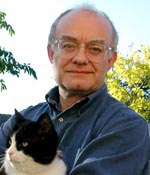Interview: John Rutter
Christmas has been the golden thread through John Rutter’s musical life


John Rutter, probably the most oft-performed living composer, has written some 60 non-Christmas pieces, including the respected Requiem, but it’s his misfortune or, perhaps, blessing that he is chiefly associated with carols. Most music heard this month will be credited ‘arr.
John Rutter’ and his Shepherd’s Pipe Carol, written when at Highgate School, has sold more than one million copies in sheet music alone. And this charming, friendly man remains philosophical about his pigeon-holing. ‘Christmas has been the golden thread through my musical life, but I have gone through periods of rebellion,’ he admits. ‘I felt it made it harder to be taken seriously as a composer, but I’ve come out the other side.
The carol is the oldest vernacular form of music and an art form that British composers have made their own.’ Critics have occasionally dismissed Mr Rutter’s melodic, touching style of writing and arranging as ‘too accessible’ or ‘sweet’; many more, however, find it a relief from self-conscious contemporary works. Again, the contemplative and courteous Mr Rutter is phlegmatic. ‘I think the same proportion of current music will endure as before, which is about 10%.
There was plenty of dross in the past, but now there’s so much that we can’t see the wood from the trees. If I hear music which is a bit abrasive or forgettable, I just think to myself that it’ll probably not endure.’ The other pivotal element in Mr Rutter’s life is Clare College, Cambridge, where he studied under ‘Mr Christmas’ himself, Sir David Willcocks.
Mr Rutter describes his surprise at being summoned one morning and, with shaking hands, handing over a pile of compositions. An offer from the Oxford University Press came two days later, and he became co-editor with Sir David of the Carols for Choirs series and 100 Christmas Carols, without which almost no choir functions. ‘David could have said “Who’s that upstart?”, but instead he said “Let’s bring him into the tent”. He showed that carols don’t have to be set in stone no one will forget the first time his descant to O Come all Ye Faithful burst upon the world.’
Mr Rutter was married at Clare chapel; his son, Nick, is a choral scholar there, and his older son Christopher’s funeral took place there in 2001, after he was hit by a car as he emerged from choir practice, a tragedy that prompted the moving work Mass of the Children. Mr Rutter only gave up being director of music there ‘because it was so seductive an environment that I thought I’d never leave and might die frustrated from the pieces I’d never written’. Instead, he became one of the first composers to convert to computers, founded the recording label Collegium, fortuitously hitting the new CD market (it began in 1983) at a time when choral music was blossoming. ‘A lot of choral music hadn’t been recorded the major labels weren’t doing it and it was an opportunity.
The standard wasn’t that good when I was growing up, but since Cambridge colleges became mixed sex, there’s been a body of adult women who have a background of liturgical training, and groups such as the Tallis Scholars and The Sixteen started.’ Collegium is literally a cottage industry the recording studio is in the garden of the Rutters’ Cambridgeshire village home although he composes five miles away in an ‘idyllic’ little cottage (‘very sheep may safely graze’) found by his wife, Joanne. She is American and plays the viola; they met 30 years ago at a choral workshop in California. Apart from about 20 ‘come singing’ workshops, most of his conducting appointments are abroad, especially in the US. ‘I lead a quiet, private life at home.
Sign up for the Country Life Newsletter
Exquisite houses, the beauty of Nature, and how to get the most from your life, straight to your inbox.
I don’t define myself as a conductor, but I’d go nuts without it, because it’s social. Being a musician solves some problems, as you never doubt what you want to do, but it can become too absorbing. JoAnne says that, when I’m working on a piece, I can be a bit of a zombie. It’s like diving you hope that, when you break the surface, your friends will still be there.’
Country Life is unlike any other magazine: the only glossy weekly on the newsstand and the only magazine that has been guest-edited by HRH The King not once, but twice. It is a celebration of modern rural life and all its diverse joys and pleasures — that was first published in Queen Victoria's Diamond Jubilee year. Our eclectic mixture of witty and informative content — from the most up-to-date property news and commentary and a coveted glimpse inside some of the UK's best houses and gardens, to gardening, the arts and interior design, written by experts in their field — still cannot be found in print or online, anywhere else.
-
 What should 1.5 million new homes look like?
What should 1.5 million new homes look like?The King's recent visit to Nansledan with the Prime Minister gives us a clue as to Labour's plans, but what are the benefits of traditional architecture? And can they solve a housing crisis?
By Lucy Denton
-
 The battle of the bridge, Balloon Dogs and flat fish: Country Life Quiz of the Day, April 15, 2025
The battle of the bridge, Balloon Dogs and flat fish: Country Life Quiz of the Day, April 15, 2025Tuesday's quiz tests your knowledge on bridges, science, space, house prices and geography.
By James Fisher